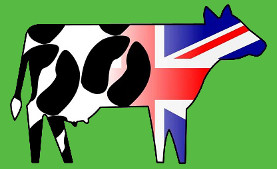By de Passille, A. M. and Rushen, J. and von Keyserlingk, M. A. G. and Weary, D. M., Journal of Dairy Science, 2009
Research Paper Web Link / URL:
http://www.sciencedirect.com/science/article/pii/S0022030209707350
http://www.sciencedirect.com/science/article/pii/S0022030209707350
Description
Concerns about the welfare of animals typically include 3 questions: is the animal functioning well (e.g., good health, productivity, etc.), is the animal feeling well (e.g., absence of pain, etc.), and is the animal able to live according to its nature (e.g., perform natural behaviors that are thought to be important to it, such as grazing)? We review examples, primarily from our own research, showing how all 3 questions can be addressed using science. For example, we review work showing 1) how common diseases such as lameness can be better identified and prevented through improvements in the ways cows are housed and managed, 2) how pain caused by dehorning of dairy calves can be reduced, and 3) how environmental conditions affect cow preferences for indoor housing versus pasture. Disagreements about animal welfare can occur when different measures are used. For example, management systems that favor production may restrict natural behavior or can even lead to higher rates of disease. The best approaches are those that address all 3 types of concerns, for example, feeding systems for calves that allow expression of key behaviors (i.e., sucking on a teat), that avoid negative affect (i.e., hunger), and that allow for improved functioning (i.e., higher rates of body weight gain, and ultimately higher milk production).
Concerns about the welfare of animals typically include 3 questions: is the animal functioning well (e.g., good health, productivity, etc.), is the animal feeling well (e.g., absence of pain, etc.), and is the animal able to live according to its nature (e.g., perform natural behaviors that are thought to be important to it, such as grazing)? We review examples, primarily from our own research, showing how all 3 questions can be addressed using science. For example, we review work showing 1) how common diseases such as lameness can be better identified and prevented through improvements in the ways cows are housed and managed, 2) how pain caused by dehorning of dairy calves can be reduced, and 3) how environmental conditions affect cow preferences for indoor housing versus pasture. Disagreements about animal welfare can occur when different measures are used. For example, management systems that favor production may restrict natural behavior or can even lead to higher rates of disease. The best approaches are those that address all 3 types of concerns, for example, feeding systems for calves that allow expression of key behaviors (i.e., sucking on a teat), that avoid negative affect (i.e., hunger), and that allow for improved functioning (i.e., higher rates of body weight gain, and ultimately higher milk production).
We welcome and encourage discussion of our linked research papers. Registered users can post their comments here. New users' comments are moderated, so please allow a while for them to be published.
